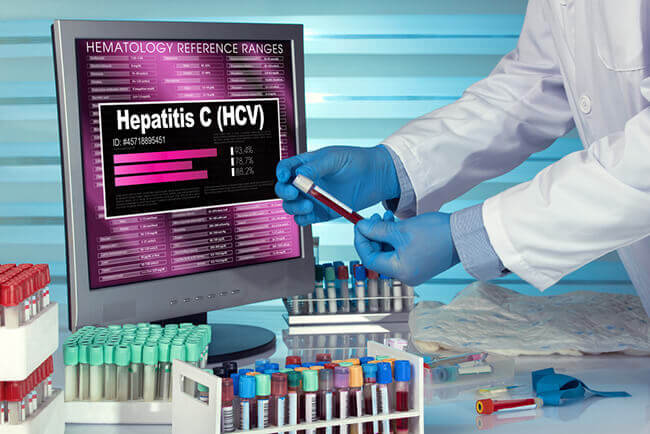Hepatitis C is an infectious liver disease caused by the hepatitis C virus (HCV). People usually have mild or no symptoms during the initial stages of the infection. Some of the signs of a hepatitis C infection include abdominal pain, dark urine, fever, and yellow skin. Since many infected individuals exhibit no symptoms, it is quite common to have hepatitis C for 15 or more years before it’s finally diagnosed. The disease is usually detected when people get tested for some other reason (for example, when donating blood).
Hepatitis C is primarily transmitted through blood, most commonly during intravenous drug use but also transfusions, needle injuries in healthcare, poorly sterilized medical equipment, etc. Unfortunately, it can also be transmitted from mother to child during birth. Hepatitis C cannot be transmitted through superficial contact, though.

Testing Solutions For Hepatitis C
You should test for hepatitis C as soon as possible if you:
- Show signs of liver disease
- Received blood from a hepatitis C positive donor
- Shared needles while injecting drugs
- Work in healthcare and are in daily contact with blood and other bodily fluids
- Had hemodialysis
- Received blood products, blood or an organ before 1992 when donated organs and blood weren’t tested for hepatitis C
- Received blood-clotting factor concentrates before 1987 (in 1987, screening them for hepatitis C became a requirement)
Finally, these are the hepatitis C testing options you currently have at your disposal:
- Hepatitis C virus test – This is a blood test designed to detect antibodies created by your immune system to fight the hepatitis C virus. It’ll show whether you’ve been exposed to the virus at some point or not. A rapid test version is also available, providing results in around 20 minutes.
- Hepatitis C RNA test – The RNA test searches for the genetic material of the virus in your blood. The test is designed to tell whether you’re infected now.
- Genospecific hepatitis C test – Knowing the kind (genotype) of hepatitis C virus you have will help your doctor immensely in determining the right course of treatment.

Hepatitis C affects the liver; therefore, you can also perform tests designed to detect potential liver problems before going straight for hep C testing. These tests include:
- Liver function test – This is a blood test created to detect potential liver damage.
- Liver biopsy – This test can only be performed by a qualified physician. They will insert a needle into the liver, detect potential scarring or damage, and determine whether it was caused by the virus.
- Imaging tests – These include the standard battery of tests you can do in pretty much any hospital (ultrasound, MRI, and CT scan). They are usually performed to exclude the possibility of liver cancer.
If left undetected and untreated, hepatitis C will often lead to liver disease and even cirrhosis. Occasionally, individuals with cirrhosis can also develop liver cancer, dilated blood vessels in the stomach and esophagus or they can simply experience an acute liver failure.
There is no vaccine for hepatitis C, but the current success rate in curing chronic infections is around 95%. Doctors usually prescribe antiviral medications whereas newer and experimental treatments can be rather expensive. Patients who develop liver cancer or cirrhosis usually require a liver transplant, but note that the virus usually recurs after transplantation. To avoid all these potential complications, you can do a simple test to check your liver function and then test for hep C if any damage is detected.
